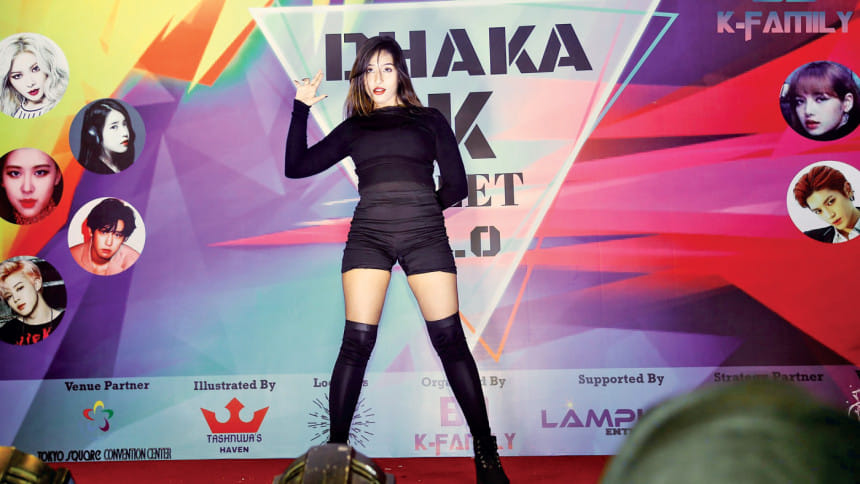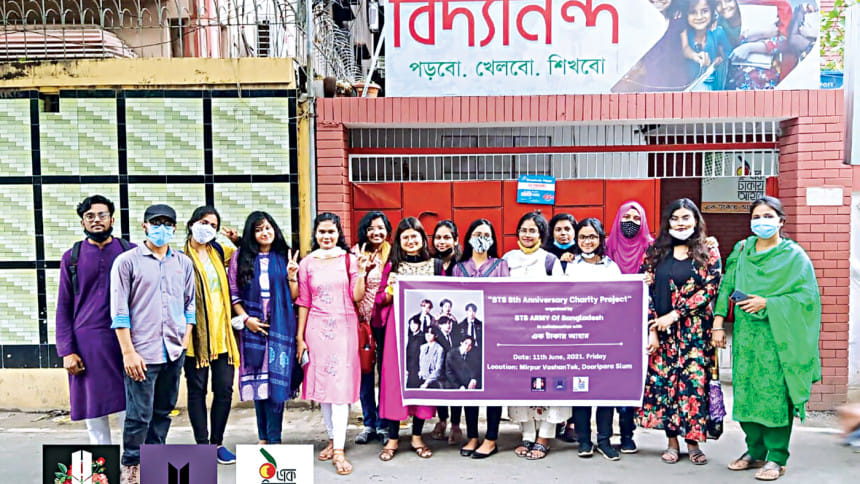Embracing a new culture

The Hallyu Wave, or the increasing popularity of South Korea's economy exporting pop culture, entertainment, music, TV dramas, and movies, has taken the world by storm in the last decade. Bangladesh has not lagged behind.
The prevalence of the internet and Korean channels have also contributed to the growing popularity of Korean pop music, simply known as K-pop, and Korean dramas, simply known as K-dramas. Groups like Bangtan Sonyeondan (BTS), SEVENTEEN, BLACKPINK, Stray Kids, NCT, and GFRIEND are winning over audiences with their catchy music, complex choreography, androgynous style, music videos with incredible production value, and holistic form of pop entertainment that not many music industries have been able to pull off.
To paint a clear picture of the impact of Korean pop culture on people in Bangladesh, we spoke to fans to understand their experiences.
Despite the language and cultural differences, fans have open-mindedly embraced Korean pop culture. When asked how she copes with the language barrier, 24-year-old Tasnim Tarannum Khan, a private university student from Dhaka, shared her insights.
"The lyrics of BTS talk about many alarming issues existing in the society, like mental health, politics, the education system, and self-assurance. They are very vocal about the struggles of life and inspire you to keep working hard, even if you do not have a set goal," Tasnim said. "I find their lyrics truly consoling, especially when times seem dark. I can relate every line with my own life as if they are singing about my own happiness and struggles, so it is very easy to connect with them."
Many have also turned to learning Korean through the Duolingo app, and have expressed genuine love for the language due to its simplicity. Moreover, the global impact of K-pop has made translations in several languages very easy to find.
"The community has dedicated fan accounts on every platform to translate any piece of Korean content, as soon as they are released. So, I don't find any difficulty keeping up," Tasnim gushed. Fans also stream music videos and vote for their favourite songs and artistes consistently.
When 23-year-old Tina Zahan, a trainee lawyer and co-founder of BD K-Family, was asked about the groups that made her fall in love with K-pop, she mentioned Kangta, TVXQ, BOA, and SES, K-pop idols from the late 1990s and early 2000s.

"K-pop is basically a part of my life now. The music and the artistes give us fans hope and help us with our lives when it gets difficult," Tina stated. BD K-Family organises events and conventions in collaboration with the Korean Embassy. The BD Army Fest and Dhaka K-Meet are events fans of BTS, known as Adorable Representative M.C. for Youth (ARMY), and other K-pop fans, look forward to. They also have a YouTube channel where they post covers of K-pop songs, as well as dances and videos from their events.
K-pop fan communities are also known to be highly charitable. Smile More is a non-profit organisation run by volunteers of BD K-Family, helping people deprived of basic necessities.
In addition, BTS ARMY of Bangladesh has arranged quite a few birthdays and anniversary projects on behalf of the popular band.
Some of them are NamKook Tree Plantation Project 2019, Iftar during Covid 2020 in collaboration with Shunte Ki Pao?, Project Boi Bondhu, and BTS 8th Anniversary Charity Project.
These projects include feeding children living in orphanages, planting almost a hundred trees in their vicinity, donating books for underprivileged children and providing items for relief during winter. Such services are extended to stray animals, too. Through BTS Army of Bangladesh's Project Pawmis, in collaboration with the Animal Welfare Club of Dhaka University, 45 dogs in the Dhaka University campus were fed and provided with free medical services and vaccinations.

A common misconception that lies among the masses is that only young women and girls listen to K-pop. However, a lot of men enjoy the music just as immensely. Imran Rahman, a 24-year-old corporate employee, discovered K-pop as a teenager from Arirang TV, a Korean channel.
"Ten years ago, we would be happy to just meet up at a restaurant and talk about our favourite Korean bands and K-dramas. Now, K-pop is so huge. There are events every few months, from competitions to fan interactions to merchandise shops. It is honestly a delight," he said. When asked what he loved about K-dramas, he noted their interesting storylines and the chemistry between the actors.
Make-up is seen as a feminine accessory in most cultures. However, in the Korean pop industry, it is seen less as only a feminine tool and more as a form of art and expression. In South Korea, one's outward appearance is treated with immense respect and importance.
Touhid Islam Ohi, a 21-year-old Bangladeshi computer repair professional working the US, spoke positively of K-pop artistes using make-up, irrespective of their gender. He said, "I believe this neutral usage influences fans to be more expressive and comfortable to show their own styles." K-dramas are one of the more obvious gateways for getting into K-pop. Anika Zaman*, a 22-year-old fan spoke about her experiences of getting into the music genre.
"I was in the eighth grade and my tutor was very much into K-pop and K-dramas. She gave me her hard disk and I took many K-dramas and music videos from it," she said. "I fell in love with the group, SS501, through their original soundtrack for the K-drama 'Boys Over Flowers', and have been into K-pop ever since."
Kamrun Nahar Neela, a software engineer in her late 20s shared similar sentiments. "One of my friends recommended a K-drama to me back in 2012, 'You are Beautiful!' From there, I discovered SHINee. I suppose, there was no going back from there," she said.
The Covid-19 pandemic has been a difficult time for everyone. Fans admitted that K-pop and K-dramas really helped them cope with the situation. "I was glued to my laptop for the longest time, watching one K-drama after another, and tons of music videos. My consumption went up as a passive coping mechanism," Anika confessed.
K-pop groups have won many international awards. We all know how "Gangnam Style" by PSY became a phenomenon. However, a year before its release, in 2011, BIGBANG was the first Korean act to win Best Worldwide Act at the MTV Europe Music Awards.

EXO, one of the most popular K-pop groups of all time, has won multiple international awards for their contribution to the Korean pop industry. BTS has been nominated for close to 700 awards to date, winning 425 of them. They have won multiple American Music Awards, Billboard Music Awards, and are the first Korean pop act to have received a Grammy nomination. Groups like SEVENTEEN, GFRIEND, NCT, and Stray Kids also enjoy immense popularity globally.
"Seeing a band you have loved for so long finally getting the appreciation they deserve is a great feeling. These artistes have worked so hard for so many years, and so, when they finally get the global limelight, it is rewarding for them, their fans, and the whole industry," said 25-year-old Shoaib Ahmed, a journalist by profession.
It is incredible to see the positive impact the Hallyu Wave has had on different people in Bangladesh. The stigma surrounding Korean culture has also begun to diminish, and we can only hope that soon enough, people will see K-pop and K-dramas for the joy they truly spread.
*Name has been changed for privacy.
The author is a freelance journalist. Email: [email protected].

 For all latest news, follow The Daily Star's Google News channel.
For all latest news, follow The Daily Star's Google News channel. 



Comments